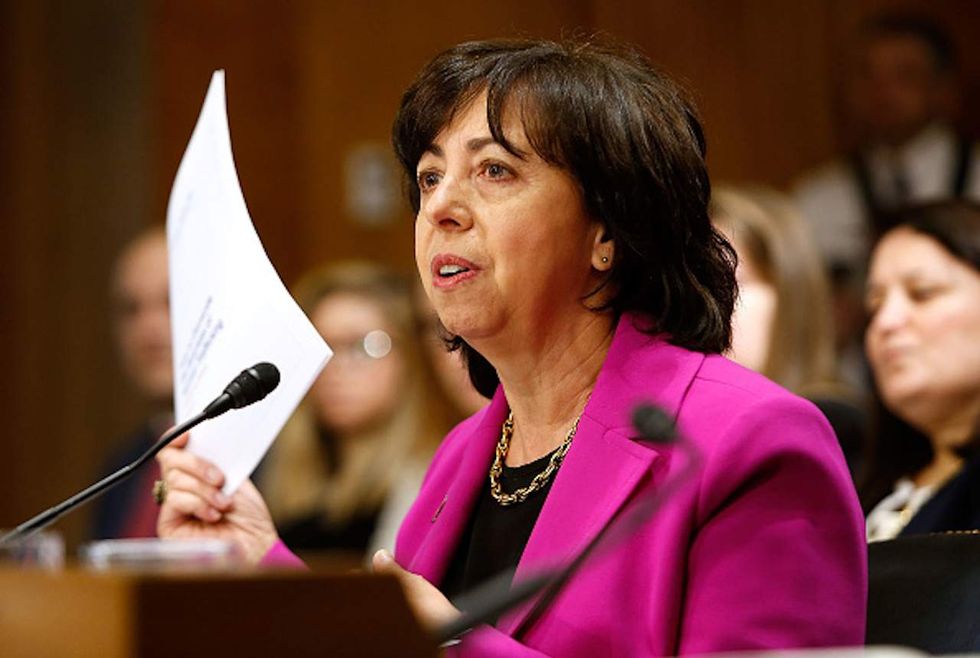
Elisa Massimino, president of Human Rights First, speaks at a Senate Foreign Relations Committee hearing on Ending Modern Slavery: Building on Success on Feb. 15, 2017. (Getty Images/Paul Morigi)

President Donald Trump’s executive order temporarily halting the U.S. from taking in refugees is detrimental in the fight to eradicate human trafficking, the president of a human rights nonprofit testified before a Senate committee Wednesday.
Elisa Massimino, president and CEO of the nonprofit Human Rights First, argued before the Senate Committee on Foreign Relations Wednesday that the refugee crisis benefits those who exploit and traffic the world’s most vulnerable people. And a ban on refugees — even a temporary ban — is detrimental and “particularly cruel” to victims, she argued.
“In light of this crisis, the recent executive order blocking the resettlement of refugees and reducing refugee admissions and halting the entire refugee resettlement program for the foreseeable future is particularly cruel,” Massimino said. “Turning our backs on the people most vulnerable to slavery, the very people this committee has worked so hard to help, not only breaks faith with our most cherished ideals, but it’s a gift to those who profit from human misery.”
“As a nation that once pledged to stand firm for the nonnegotiable demands of human dignity, I think it’s unconscionable,” she added later in her testimony. “It’s not who we are, it’s not what we stand for.”
Massimino also argued that, in order to focus on prevention, recognizing the plight of refugees and caring for those people is key.
“Traffickers are opportunistic and ruthless. They are drawn like sharks to those in distress, and it’s hard to imagine people in more distress today than the refugees,” she said. “In fact, with the possible exception of Vladimir Putin, nobody benefits more from the refugee crisis than those in the business of modern slavery.”
“The truth is, we simply cannot combat slavery without attending to those most vulnerable to it. And today, more than ever, that means helping refugees,” she added.
During the hearing, scheduled ahead of the END IT Movement’s fifth annual Shine a Light on Slavery Day, Massimino contended that the United States’ leadership on ending trafficking is crucial to both the practice abroad and in the U.S.
Massimino said:
American efforts to end modern slavery are critical, not only to end human trafficking here at home, but to ensure that our country sets an example for others. That's why we need to work harder to eliminate slave labor from the supply chains of American companies and empower federal law enforcement agencies which have deep expertise in prosecuting cross-border organized crime to focus greater attention on ending impunity for traffickers and their enablers.
Actor Ashton Kutcher also testified during Wednesday’s hearing in which he shed light on some of the technological advances used to combat trafficking. As the co-founder and chairman of the tech company Thorn — which combats child exploitation — Kutcher praised those in the private sector who “take risks” when developing tools to combat the issue.
But he, too, placed an emphasis on how the refugee crisis fuels trafficking.
“When people are left out, when they’re neglected, when they’re not supported and when they’re not given the love that they need to grow, it becomes an incubator for trafficking,” Kutcher said. “And this refugee crisis, if we want to be serious about ending slavery, we cannot ignore it and we cannot ignore our support for this issue in that space because otherwise we’re going to deal with it for years to come.”
Jennifer Quigley, Human Rights First’s advocacy strategist on refugee protection, told TheBlaze that refugees can become prime trafficking targets as their vulnerability increases with their need to work to provide food and shelter — something that refugees oftentimes aren’t able to do.
“That’s the biggest issue we have,” Quigley said Wednesday after the hearing. “It increases that vulnerability to traffickers because they need to work and in most places there’s not enough access to sustained livelihoods.”
Quigley also argued that those who enter the U.S. through the refugee resettlement program aren’t terrorists; in fact, she said, they’re the most vulnerable of the vulnerable.
As Quigley said, the United Nations High Commissioner for Refugees identifies the most vulnerable — including children and the ill. And the Department of Homeland Security and State Department “vigorously screen” those coming to the U.S. as a refugee, she said.
“When you shut down that program for an unforeseeable amount of time, then that increases the level of vulnerability of those individuals to traffickers,” she said.
Massimino argued Wednesday during her testimony that the “so-called extreme vetting” is already taking place when it comes to refugees.
“The blanket ban that’s been proposed would not block terrorists. Our nation’s national security experts already do that,” she said. “But it would block people forced to flee because of persecution and violence inflicted by oppressive regimes and terrorist groups. And it will block people who are vulnerable to the parasitic criminals and violent extremists who profit from the global slave trade.”
“I urge you to allow your compassion for its victims to inform your position on refugees,” Massimino continued. “Anyone who seeks to deprive traffickers of their ability to prey on vulnerable people cannot in good conscience slam the door on refugees. We are counting on you to fight an executive action that would sacrifice more innocent women and children to the global slave trade.”